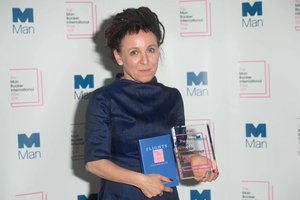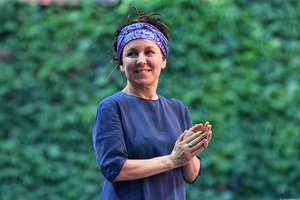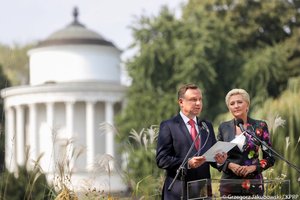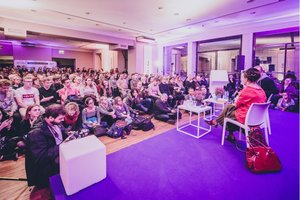The London Book Fair 2017: Karłowicz and Nowak on intellectuals in the media
Dariusz Karłowicz and Andrzej Nowak debated the role of intellectuals in the media during the 2017 London Book Fair. In the conversation lead by Doug Wallace, they were joined by the BBC Radio journalist Ekow Eshun. The event, titled "Intellectuals in the Media", took place at the Olympia Hall.
Doug Wallace began on a somewhat provocative note, asking his guests to comment on the last session of the European Council during which Donald Tusk was re-elected as president. He asked about the media coverage of this event in Poland and across Europe.
Simplified narratives
Prof. Andrzej Nowak responded first. He remarked that Poland and Poles are largely misunderstood in Europe. “This is due to a number of factors,” he said. “One of them is surely because of the fact that few people in Western Europe take the trouble to understand Poland’s cultural circumstances and tradition, the latter being firmly grounded in Catholicism and marked by mono-ethnicity”.
Prof. Nowak went on to say that following the first partly-free parliamentary elections of the late 1980s and early 1990s, significant media outlets in Poland fell into the hands of the post-communists, who dominated the market until around 2010. “The post-communists and liberals proved capable of imposing their narrative, which became binding in the mass media. It was disseminated in state and private media alike,” he pointed out.
According to Prof. Nowak, similar narratives and ways of imposing them have marked the experience of other countries. “Similar attempts can be seen in the United States, France, Germany, and Italy. In recent years, the domination of a single circle, with strong ties to “Gazeta Wyborcza”, has begun to wane because other media outlets, which may be described as right-wing or conservative, had appeared on the Polish scene,” Nowak said. In his view, however, this did not raise the standard of debate, but only created greater pluralism. Summing up this part of discussion, the Krakow-based historian noted that intellectual presence and solid debate in the media is currently giving way to the confrontation between two mutually antagonistic options.
Dariusz Karłowicz, on the other hand, described the situation in Poland as a political and cultural conflict, dating back to the period of political transformation. In his view, a large part of Polish society has simply begun to experience the brutal consequences of political change. “As a simple and obvious example, take the scale of poverty in Poland. Figures illustrate this very clearly. In 2014, 16% of Poles lived below the poverty line, whilst 7% lived below subsistence level,” Karłowicz said, drawing a wider perspective. Meanwhile, for over two decades the media in Poland entirely sidestepped this issue – the editor-in-chief of “Teologia Polityczna” pointed out. “The liberal elites did not address this issue at all. Meanwhile, at the core, we are essentially dealing with the question of identity and attachment to one’s community,” Karłowicz said.
Picking up on the issue of Polish identity and trying to illuminate it for the British audience, Dariusz Karłowicz mentioned the deep rootedness of Poles in Catholicism and the Latin tradition, and so by extension also in the Roman republican tradition which, nonetheless, differs from British republicanism.
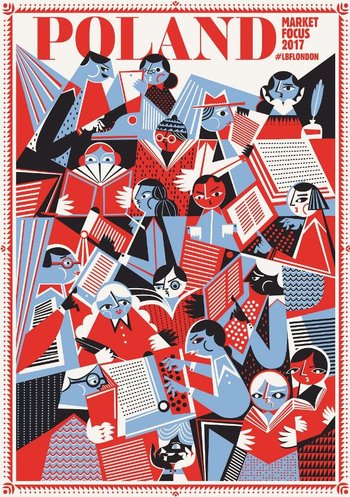 Troubles with identity
Troubles with identity
At this point the moderator, Ekow Eshun, agreed that we can’t always understand a nation or culture via clichés. “This seems to hold true for Poland,” he said. Trying to provoke another round of discussion, he expressed doubts whether the Poles, as a nation embracing only one narrative, were truly capable of understanding themselves and the world around them.
Responding to these doubts, Dariusz Karłowicz made reference to the broader problem of simplified narratives, which have become a global tendency. Recalling his stay in Ghana, he spoke of the three different tribes living there, which essentially differ in everything from religion to language and origins. “Meanwhile, to a Westerner, Ghanaians are simply Africans. It’s a similar thing with the way Muslims are treated, particularly those from the Middle East. For an average European, people from that part of the world are simply Arabs. Meanwhile the differences between them are much more pronounced than those between the most unalike nations of Europe,” Karłowicz said.
Returning to the notion of identity and introducing the English-speaking public to Polish self-perceptions, the editor-in-chief of “Teologia Polityczna” cited the figure of the well-known film protagonist Jason Bourne. In his view, Poland and Poles are a bit like the film protagonist, who has lost his memory and doesn’t know his identity. “The only thing Poland and Bourne have allegorically left, are certain reactions and skills. And this is enough to embark on a search for one’s identity and roots and ask the key question: ‘Who are we’?” Karłowicz said. In his opinion, this process had begun after 1989, but only to a very limited extent. “It should be guided and supported by state institutions, whereas this hasn’t always been the case,” he explained.
This, Karłowicz continued, also sheds new light on the trouble Westerners have with understanding Polish identity. “How are they to understand who we are if we don’t know it ourselves?” he asked rhetorically. Adding that it was no coincidence that Robert Ludlum, the author of the book the film was based on, named his protagonist Jason. “The name refers to the mythical voyage of Jason and the Argonauts to retrieve the Golden Fleece,” Karłowicz stated.
His allegory stirred up a polemical response from Prof. Nowak, who claimed that Poles have not lost their memory and that there is much to build on, while both nineteenth and twentieth century provide numerous models. The key problem, in his view, is that there are two clashing visions: whether we should reject our tradition and history, ergo our old identity, and immerse ourselves in the current of Western modernist change, or draw on the legacy of past centuries. According to Nowak, Poland differs significantly, even from the nations of Central and Eastern Europe, and moreover, is internally divided. Importantly, knowledge about Poland, as presented at Western universities, is infused with a Russian outlook, because Western intellectuals seldom know the Polish language and draw their information from Russian research and media.
Continuing the conversation, the host asked the panellists about they key to the definition of our identity and whether there is anything that they find unintelligible when it comes to the Polish understanding of the Poles’ own identity.
Responding, Dariusz Karłowicz cited Plato’s Phaedrus and the text’s question about the purpose of journey and perception thereof – returning to the past or focusing on the future. “After 1989, some Poles don’t know how to define themselves. They are not entirely sure what Polishness is and can’t entirely grasp this idea, although they don’t define themselves as Europeans either. In a way, they are suspended,” he said.
 Referring once more to the legacy of ancient Rome in Polish consciousness, Karłowicz mentioned “Teologia Polityczna” yearbook My, Rzymianie (We, Romans). He emphasised that this publication consistently tries to go beyond Polish and Western stereotypes of Poland as “something” in between Orthodox Christianity and Protestantism, deriving certain characteristics from the one and from the other. The Polish attachment to republican values such as liberty, sovereignty and democracy is impossible for Germans and Russians to understand, for they are immersed in a long-established tradition of imperialism. During the partition period, these national traits of Poles, deriving from democratic traditions, were perceived as a manifestation of rebellion, which by necessity had to lead to their suppression. Invaders had to use force to alter the perception of our identity, adapting it to theirs,” he stressed.
Referring once more to the legacy of ancient Rome in Polish consciousness, Karłowicz mentioned “Teologia Polityczna” yearbook My, Rzymianie (We, Romans). He emphasised that this publication consistently tries to go beyond Polish and Western stereotypes of Poland as “something” in between Orthodox Christianity and Protestantism, deriving certain characteristics from the one and from the other. The Polish attachment to republican values such as liberty, sovereignty and democracy is impossible for Germans and Russians to understand, for they are immersed in a long-established tradition of imperialism. During the partition period, these national traits of Poles, deriving from democratic traditions, were perceived as a manifestation of rebellion, which by necessity had to lead to their suppression. Invaders had to use force to alter the perception of our identity, adapting it to theirs,” he stressed.
Prof. Nowak cited a recent statement by the former president of the United States, Bill Clinton, who spoke of Poland, Hungary and Russia as having abandoned the path of the rule of justice and limiting civil liberties. “In this strident statement, the president showed a lack of historical knowledge, since in Europe, particularly Central and Eastern Europe, the first liberties were introduced by the monarchies that today are Poland and Hungary,” he explained to the audience, adding, “I am not saying that everything that is now going on in Poland is worthy of praise, but one shouldn’t distort the actual state of facts”.
Poles apart
Joining the discussion, Ekow Eshun noted that a key problem of media discussions is the polarisation of camps that have completely taken over the media scene. Opting for “progress” or “tradition” is necessary, yet it curtails debate and results in polarisation. In passing, Eshun also mentioned the UK’s large Polish immigrant community and the valuable contribution of Polish culture to the UK’s multi-cultural scene.
There were also questions and comments from the audience. Ursula Phillips said that in her view the Polish media landscape after 1989 was not what Prof. Andrzej Nowak made it out to be. In her opinion, there were other media outlets unaffiliated with “Gazeta Wyborcza”, such as “Nasz Dziennik” or “Rzeczpospolita”.
In response, Nowak noted that although these other outlets did exist, they were latecomers to the market and did not have a sufficiently significant impact on shaping reality, which was largely due to their lack of financial and technical resources. “This has been changing for a number of years, although dailies, including "Rzeczpospolita" – the top opinion-shaping forum for genuine debate, is witnessing a steady decline, which reflects the global trend,” he added.
Towards the end, the host asked whether there is a problem with Russian-driven media propaganda in Poland. Both guests from Poland agreed that not to the same extent as in France or Germany. Referring back to earlier statements, Dariusz Karłowicz said that the nature of the media had changed. “Their commercialisation has resulted in selling whatever patrons pay for and whatever is profitable. Matter-of-fact discussion and reliable information is not a priority for an enterprise that is supposed to make money. In the Polish reality, this complex media puzzle is compounded by a lack of distinction between public and private interest, which leads to the particularisation of concluded,” the editor-in-chief of “Teologia Polityczna” concluded.
Ekow Eshun, the BBC radio journalist, undauntedly kept returning to the question of where the current image of Poland in international media comes from, and how it should be corrected according to the interlocutors. In response, Prof. Andrzej Nowak said that there certainly is no worldwide conspiracy to defame Poland in international media, only the image of the situation in Poland as presented in Western media is derived from a single source – “Gazeta Wyborcza”. “There are violent emotions in the media and we need rapid and decisive action, and this isn’t just about Poland’s experience. It’s not good for Poland to boil itself down to Catholicism, tradition and nationhood, or, at the other extreme, to renounce the past and, by the same token, identity. The solution is to wisely draw and build on a rich history and identity, while remaining open to Europe and the world,” the Krakow-based historian concluded.
Author: Mikołaj Marczak
Source: “Teologia Polityczna”
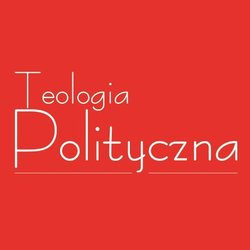
22.03.2017



